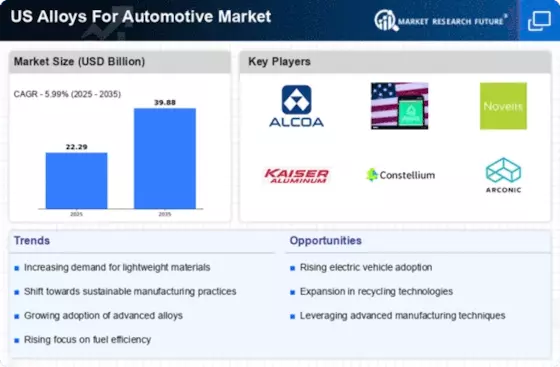US Alloys for Automotive Market Summary
The US Alloys for Automotive Outlook market is projected to grow significantly from 235.94 USD Billion in 2024 to 541.32 USD Billion by 2035.
Key Market Trends & Highlights
US Alloys for Automotive Outlook Key Trends and Highlights
- The market is expected to exhibit a compound annual growth rate (CAGR) of 7.84 percent from 2025 to 2035.
- By 2035, the market valuation is anticipated to reach 541.32 USD Billion, indicating robust growth potential.
- In 2024, the market is valued at 235.94 USD Billion, reflecting a strong foundation for future expansion.
- Growing adoption of lightweight materials due to increasing fuel efficiency regulations is a major market driver.
Market Size & Forecast
| 2024 Market Size | 235.94 (USD Billion) |
| 2035 Market Size | 541.32 (USD Billion) |
| CAGR (2025 - 2035) | 7.84% |
Major Players
Apple Inc (US), Microsoft Corp (US), Amazon.com Inc (US), Alphabet Inc (US), Berkshire Hathaway Inc (US), Meta Platforms Inc (US), Tesla Inc (US), Johnson & Johnson (US), Visa Inc (US), Procter & Gamble Co (US)














Leave a Comment